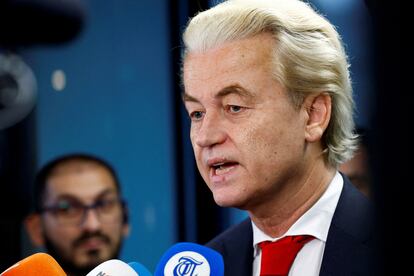Geert Wilders says he doesn’t have support of likely coalition partners to become Dutch premier
Wilders’ decision to put aside his leadership ambitions appears to be the breakthrough after two days of behind-closed-doors negotiations

Anti-Islam firebrand Geert Wilders said Wednesday he doesn’t have the support of his prospective coalition partners to become the next Dutch prime minister.
Wilders took to X, formerly Twitter, to say that “I can only become premier if ALL parties in the coalition support that. That wasn’t the case.”
His comment came after Dutch media reported that a breakthrough in coalition talks announced Tuesday night was that the leaders of all four parties involved in drawn-out coalition negotiations would remain in parliament.
That sets up the likelihood of some sort of technical Cabinet made up of experts. While it now looks like Wilders will not lead the government, he and his Party for Freedom will remain the driving force behind the administration after sweeping to a stunning victory in the Nov. 22 elections.
Wilders did not immediately respond to an emailed request for comment.
His decision to put aside his leadership ambitions appears to be the breakthrough that negotiator Kim Putters alluded to a night earlier after two days of behind-closed-doors negotiations.
While the exact contours of a new coalition Cabinet remain unclear, Putters believes that the parties are now ready to hammer out a deal. Putters was writing up a report Wednesday that he will present to lawmakers on Thursday. He also invited the four leaders to more talks Thursday morning.
“My expectation is that these parties will take the next step in the Cabinet formation,” Putters told reporters Tuesday night.
After two decades of trenchant opposition, Wilders seemed to have a shot at leading a nation that long prided itself on its tolerant society, but he has stepped aside in the interests of pushing through his agenda.
“I really wanted a right-wing Cabinet. Less asylum and immigration. Dutch people number 1,” Wilders said on X. “The love for my country and voter is bigger and more important than my own position.”
The rise of the populist far right in a polarized political landscape has been underway for years in Europe but Wilders’ victory in the Nov. 22 election still came as a shock to the Netherlands and well beyond.
Wilders has often called for a ban on mosques, Islamic schools and the Quran, but in a concession to his prospective coalition partners in January, he withdrew draft legislation to implement the bans.
The Netherlands is not alone in seeing a shift to the right.
Far right parties also are expected to make significant gains in June elections for the European Union’s parliament and Portugal’s inconclusive result in Sunday’s election thrust the populist Chega — or Enough — party into a possible kingmaker’s role. Chega’s leader, Andre Ventura, has made common cause with other right-wing parties across the continent.
Wilders spent Monday and Tuesday in talks with Putters, and the leaders of the center-right People’s Party for Freedom and Democracy, populist Farmer Citizen Movement and centrist New Social Contract.
“They were good talks and produced results. I have drawn my conclusions,” Putters, a former Senator for the center-left Labor Party, told reporters. Once lawmakers have digested his report, they will hold a debate week to decide what happens next.
Wilders did not speak to reporters after the two-day meeting wrapped up, nor did Dilan Yeşilgöz-Zegerius, the new leader of the People’s Party for Freedom and Democracy, or VVD, who replaced four-term Prime Minister Mark Rutte.
With New Social Contract leader Pieter Omtzigt ruling out joining a majority Cabinet led by Wilders, the four parties now will likely look at other options — a Cabinet made up of experts and politicians or a minority Cabinet propped up by support from Omtzigt’s party.
The Netherlands could turn to Italy for a model of how to move past its political stalemate. Italy, which is known for its revolving-door governments, has a history of resorting to “technical” governments headed by figures outside the political party mainstream. These experts are called on to guide the country through a particular period, often due to economic instability or political gridlock, before fresh elections are held.
The most recent such government was headed by Mario Draghi, the internationally respected former European Central Bank chief who was called on to shepherd Italy through the second half of the COVID-19 pandemic, reboot economic growth and make sure the country was able to take full advantage of the EU’s COVID-19 recovery funds.
Despite his broad-based support, Draghi’s coalition of national unity collapsed in July 2022 and fresh elections were called that were subsequently won by Premier Giorgia Meloni of the far-right Brothers of Italy and her right-wing allies.
Sign up for our weekly newsletter to get more English-language news coverage from EL PAÍS USA Edition
Tu suscripción se está usando en otro dispositivo
¿Quieres añadir otro usuario a tu suscripción?
Si continúas leyendo en este dispositivo, no se podrá leer en el otro.
FlechaTu suscripción se está usando en otro dispositivo y solo puedes acceder a EL PAÍS desde un dispositivo a la vez.
Si quieres compartir tu cuenta, cambia tu suscripción a la modalidad Premium, así podrás añadir otro usuario. Cada uno accederá con su propia cuenta de email, lo que os permitirá personalizar vuestra experiencia en EL PAÍS.
¿Tienes una suscripción de empresa? Accede aquí para contratar más cuentas.
En el caso de no saber quién está usando tu cuenta, te recomendamos cambiar tu contraseña aquí.
Si decides continuar compartiendo tu cuenta, este mensaje se mostrará en tu dispositivo y en el de la otra persona que está usando tu cuenta de forma indefinida, afectando a tu experiencia de lectura. Puedes consultar aquí los términos y condiciones de la suscripción digital.








































